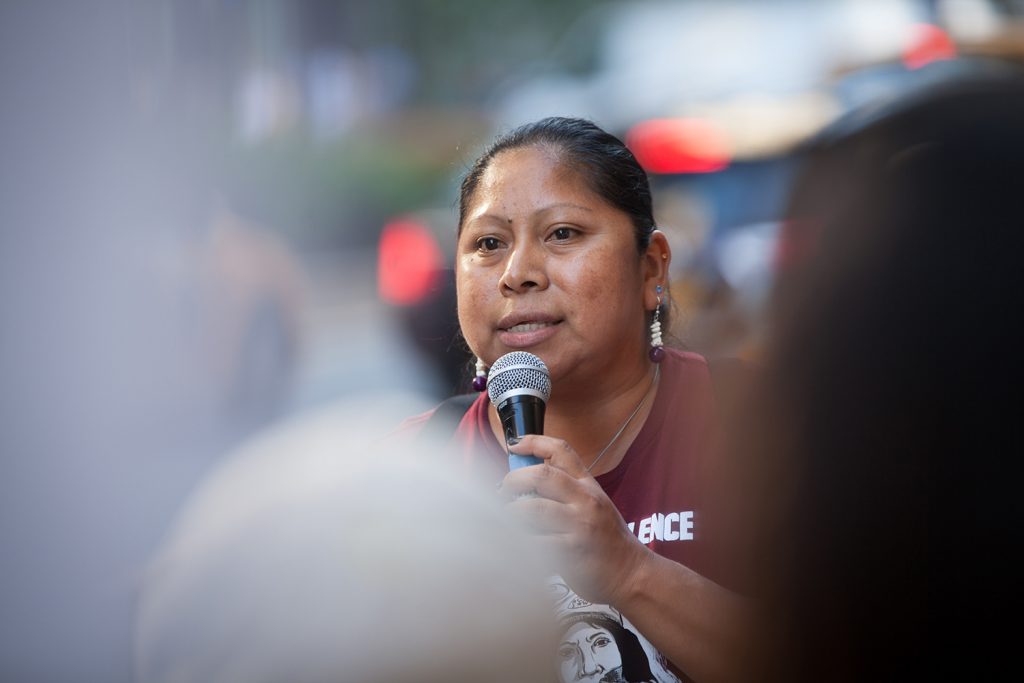CIW’s Lupe Gonzalo: “We won’t let Wendy’s executives hide behind these glass walls, and we won’t let them hide abuses behind the walls of greenhouses… So we’re going to march, with our heads held high, with pride… and we will keep doing so until Nelson Peltz and Wendy’s hear our voices as workers, respect consumers, and stop inventing programs that have failed us, every time.”
This past Thursday, hundreds of consumers, farmworkers, and their families took to the streets of Manhattan for the big “How Much Longer, Wendy’s?” march. The march was a direct response to Wendy’s continued refusal to join the Fair Food Program despite its decision, announced at the company’s annual shareholder meeting in June, to shift its tomato purchases from Mexico to U.S. and Canadian greenhouses in reaction to consumer pressure over the abysmal human rights conditions in Mexico’s produce industry.
Today, we bring you a video and photo report from Thursday’s colorful, spirited march through New York City!
Photo Report
After a 24-hour, non-stop bus ride from Immokalee, over forty farmworkers and their children arrived in front of 280 Park Avenue, home to the offices of Wendy’s Board Chairman Nelson Peltz and his investment firm, Trian Partners, Wendy’s largest shareholder.
The sidewalk in front of Mr. Peltz’s offices felt very familiar. It was only four short months ago that hundreds of workers and allies were camped in the same canyon of towering glass buildings, going without food for five days during the unforgettable Freedom Fast. The action culminated with over 2,000 supporters marching alongside workers in the the Time’s Up Wendy’s March to Mr. Peltz’s Park Avenue offices.
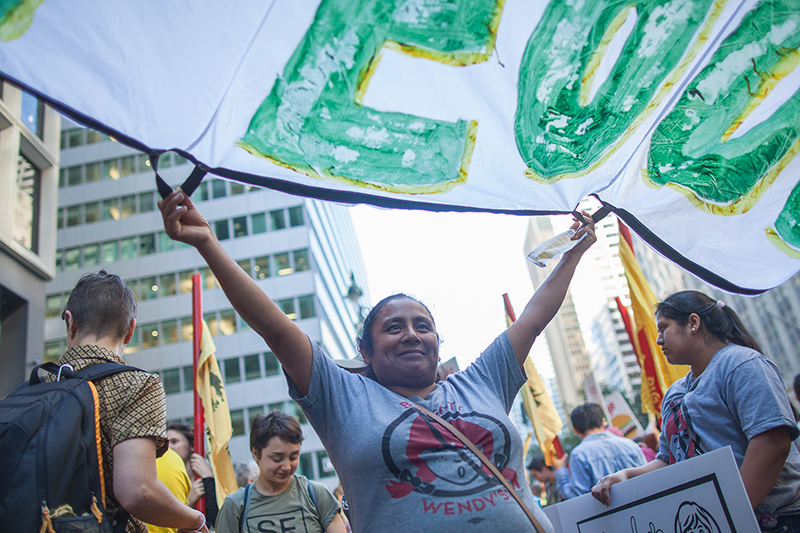
This time around, however, the bone-chilling cold and freezing rain of March were replaced by the warmth and long shadows of a summer afternoon in the City (below), as farmworkers from Immokalee were greeted by a beautiful, breezy day in Manhattan.
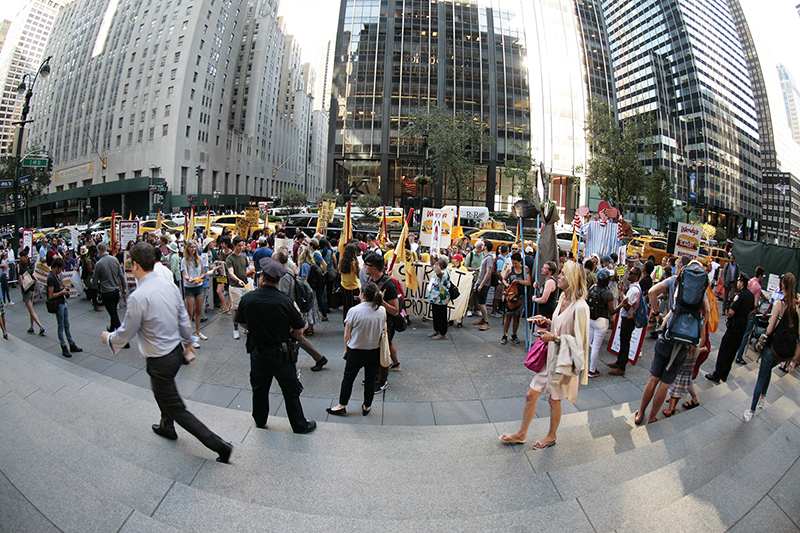
As they did during the fast in March, the children of farmworkers who rode up on the bus with their parents from Immokalee took up their stations diligently distributing flyers, offering information with a smile to the hundreds of passersby heading home from work on Park Avenue or passing through nearby Grand Central Station.
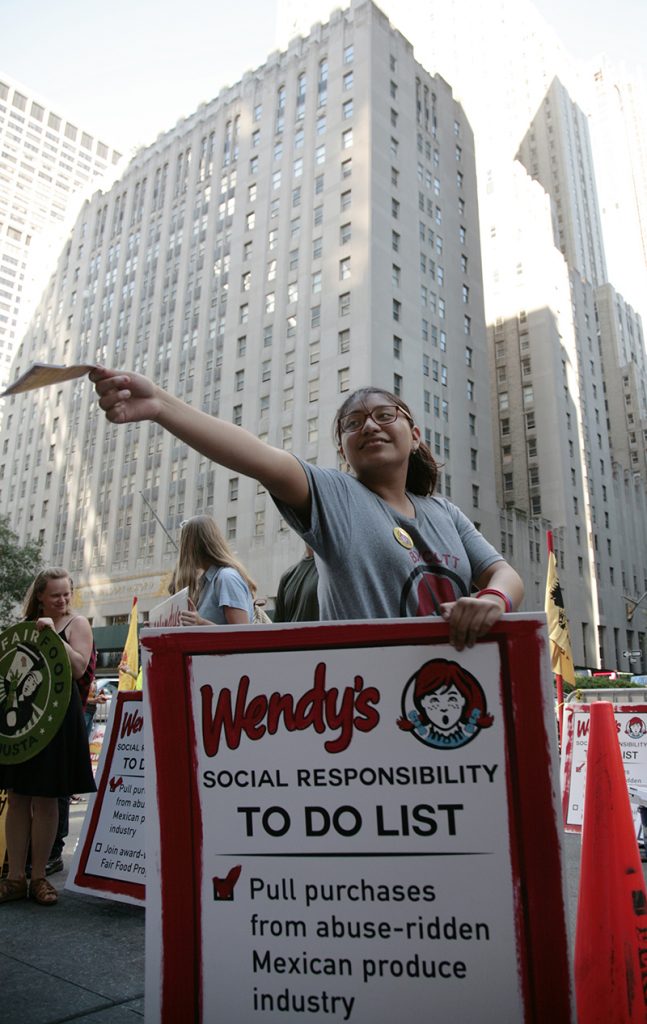
Ahead of the protesters’ arrival at Trian’s offices, the CIW’s Nely Rodriguez — joined by the Rev. Noelle Damico and Alex Schelle of the Alliance for Fair Food — approached the towering building with a 2017 Fair Food Program Annual Report in hand. The report, which clearly documents the Fair Food Program’s proven success in eradicating sexual violence, forced labor, and other major human rights abuses on participating farms, was well-received by the head of security for the building (center, below). As Nely and the other delegates noted, he listened intently to the delegation’s presentation on the merits of the FFP and expressed his admiration for the progress that farmworkers have achieved.
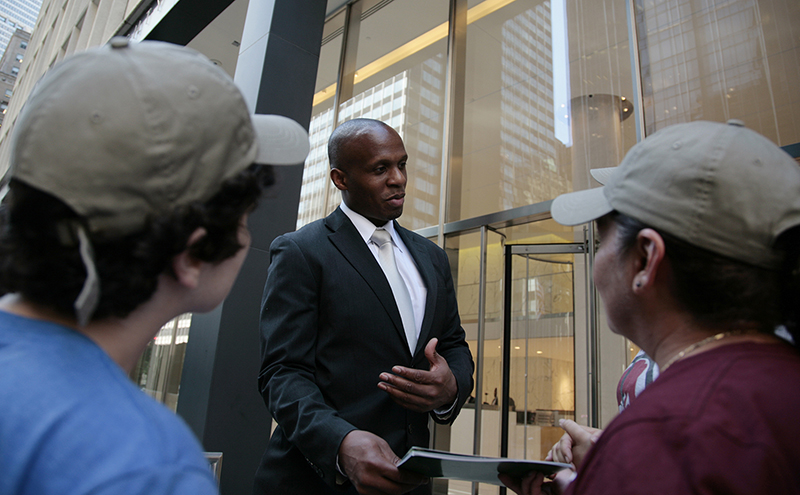
As supporters continued to arrive, CIW’s Oscar Otzoy welcomed those gathered to what is now hallowed ground in the Campaign for Fair Food. The rally kicked off with a dynamic line-up of speakers, representative of the vast diversity of allies in the movement for Fair Food: Rev. Micah Bucey of Judson Memorial Church; Amirah AbuLughod of the Community of Living Traditions at the Stony Point Center (pictured below, on top); Bryan Oliva-Infante (pictured below, on bottom), student at Florida Gulf Coast University and summer intern at AFSCME District Council 37 in New York; and Rob Robinson, longtime NYC housing rights orgaznier and staff volunteer at the National Economic and Social Rights Initiative (NESRI).
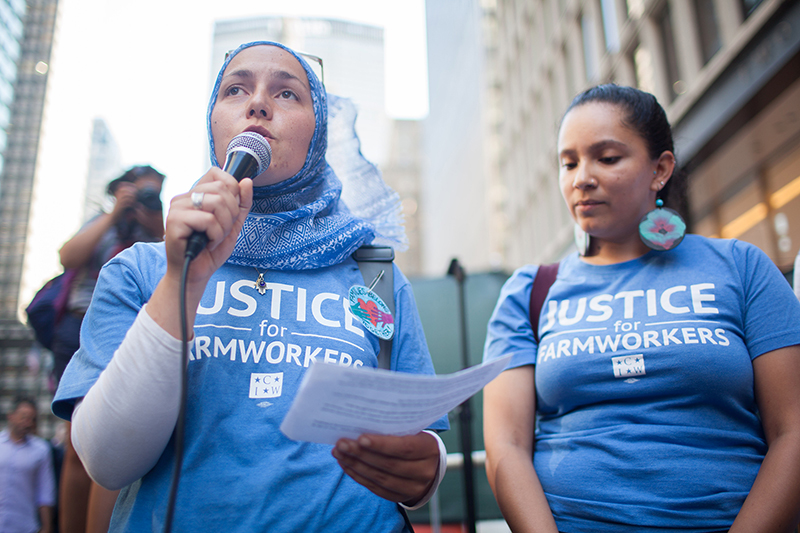
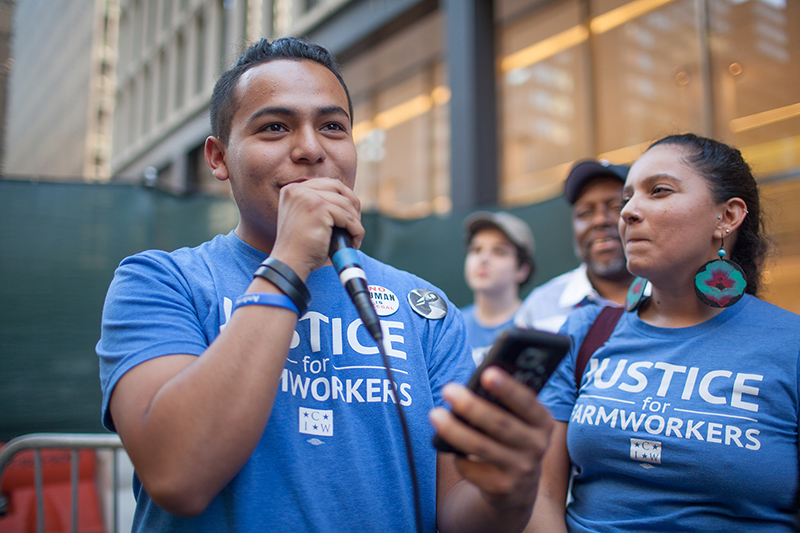
Capping off a rousing rally to launch the march, the CIW’s Lupe Gonzalo (pictured below) reminded the gathering crowd of both how far we have come in the fight to bring justice to the workers in Wendy’s supply chain, and of the long road that remains ahead as we continue the work of bringing Wendy’s into 21st century social responsibility and the real human rights protections of the Fair Food Program.
… Once again, we are here to demonstrate our strength. We have made it clear to Nelson Peltz and to Wendy’s that we will not give up until they join the Fair Food Program. After our fast of five days in this very same place, in the cold, enduring hunger, marching with 2,000 people in the streets of New York, we have taken an important step forward: Wendy’s will now only buy tomatoes from the U.S. and Canada. But another, bigger step remains – and that is to sign a Fair Food Agreement. We will not be satisfied until Wendy’s responds directly to us as workers – because to simply buy from greenhouses is not equivalent to ensuring justice and human rights.
Nelson Peltz has the obligation and the power to ensure that farmworkers – in the greenhouses and in the fields – can have a better life. He should not sit in his office, making decisions on our behalf – we are farmworkers, we are human beings, and we know the changes that we want. We won’t let them hide behind these glass walls, and we won’t let them hide abuses behind the walls of greenhouses. We want them to show their faces. So we’re going to march, with our heads held high, with pride, and leave our imprint once again here in New York City – and we will keep doing so until Nelson Peltz and Wendy’s executives hear our voices as workers, respect consumers, and stop inventing programs that have failed us, every time.
By the time the march headed out from Park Ave, hundreds of marchers had lined up, art in hand, ready to lift their voices along with farmworkers demanding Fair Food.
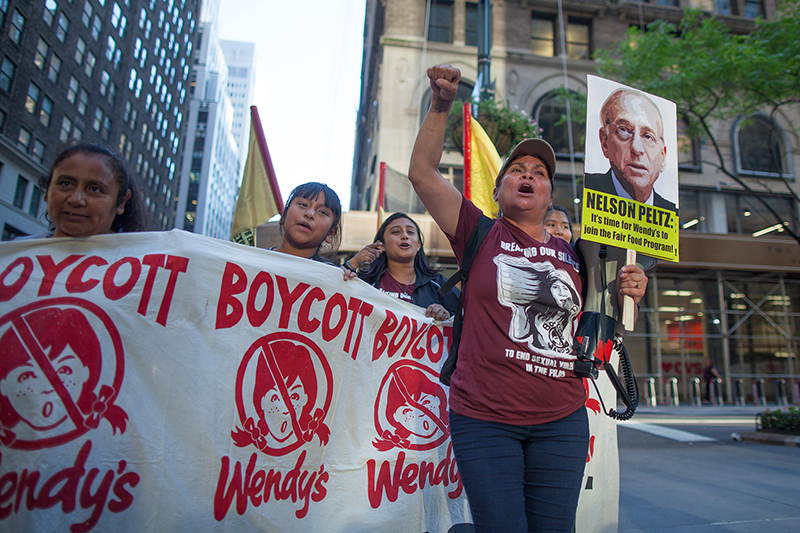
And New Yorkers were indeed ready! Farmworkers from Immokalee were joined by Street Vendor Project, Adhikaar, Make the Road, Brandworkers, Justice Center en el Barrio, National Domestic Workers Alliance, the Stony Point Center, the Benincasa community, T’ruah: the Rabbinic Call for Human Rights, United Methodist Women, representatives from the Park Slope Food Coop, NYC churches and synagogues, students from seminaries and universities across the city, and allies from as far as Ohio, Florida and Rhode Island.
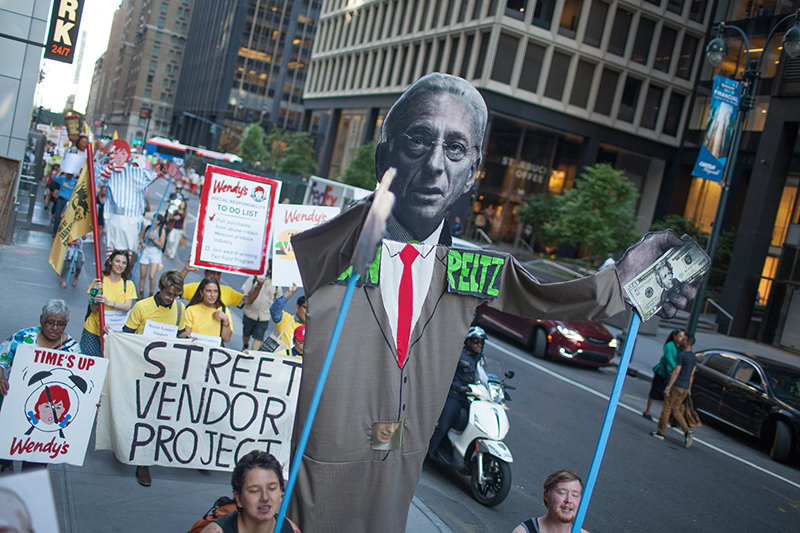
As always, the joyous march, resplendent with freshly-painted art in the early evening sun, caught the attention of tens of thousands of people in the streets and buildings of Manhattan.
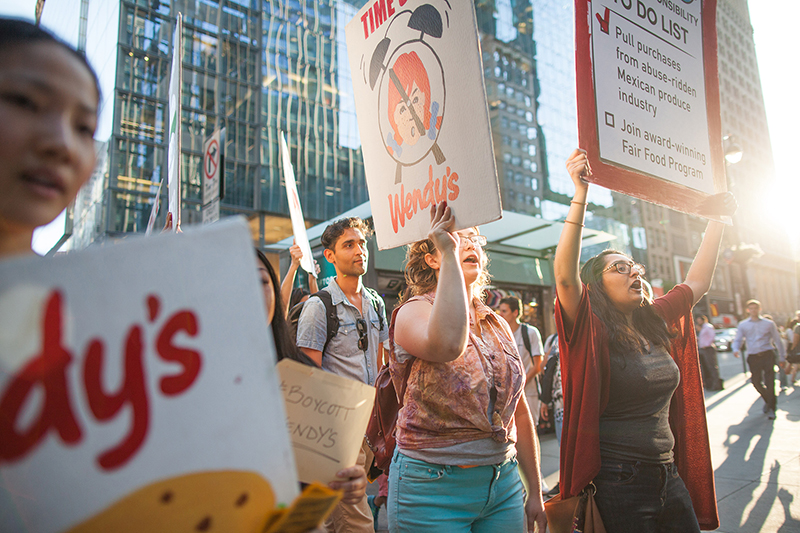
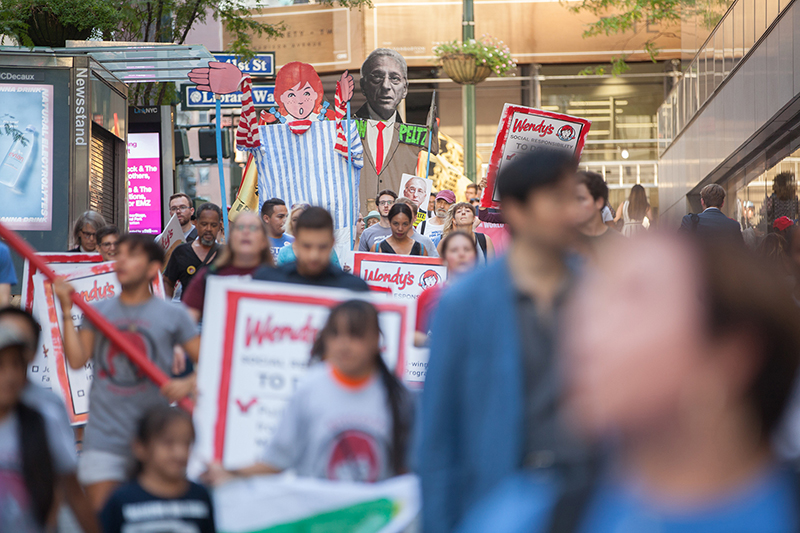
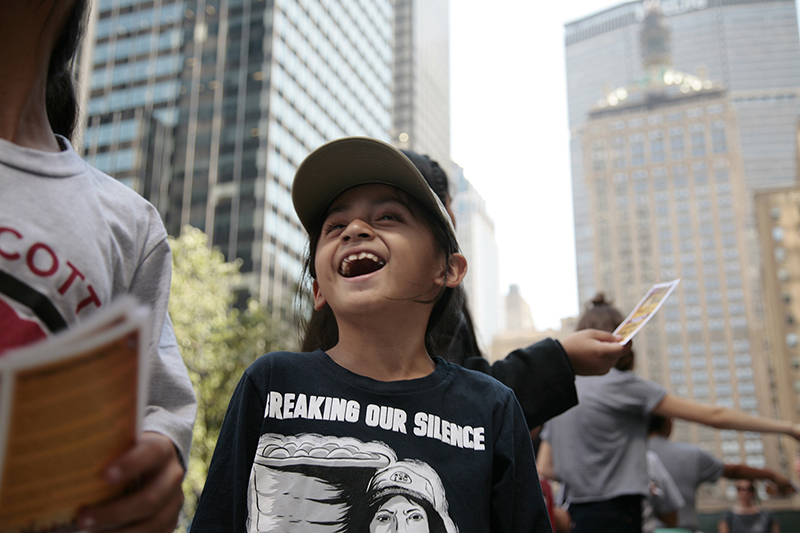
The marchers’ demand for Fair Food, and the woeful inadequacy of Wendy’s current decision to rely on the failed model of traditional CSR auditing schemes, were hammered home simultaneously in the streets and on social media.
CURRENTLY: We’re holding it down with our friends, @ciw at 280 Park Avenue. Join us & march for #fairfood! #howmuchlonger? @Wendys pic.twitter.com/oAvGK4amau
— Women’s March NYC (@WomensMarchNYC) July 19, 2018
I will always stand with #farmworkers & their right to #freedom! Sign the fair food standards act @Wendys & join #freedom loving people across the #USA & the world! @ciw #EndSlaveryNow #HaveAPurpose #BeTheSolution #IAmImmokolee pic.twitter.com/CBaXLcYtmV
— MJ (@emme_jay) July 19, 2018
Taking to the streets in NYC, @ciw demands @Wendys join the #FairFood Program and stop exploiting farmworkers. pic.twitter.com/bolUkL2h3C
— Benjamin Hoffman (@BenjamHoffman) July 19, 2018
In conjunction with the march, the Worker-driven Social Responsibility Network released on Thursday an extensive critique of one of the third-party auditors that Wendy’s offered up to consumers as the sure-fire solution for supply chain abuse, SA8000.
Social audits aren’t the solution — they are part of the problem. https://t.co/bz7RLp9GTw pic.twitter.com/W68V1L2jDc
— WSR Network (@WSRNetwork) July 19, 2018
@Wendys, you can’t protect workers rights in your supply chain unless you have workers at the table. Join the @FairFoodProgram. https://t.co/rxKdsq5xfk
— CIW (@ciw) July 19, 2018
One of CIW’s longtime close allies, T’ruah’s Rabbi Salem Pearce, brought the action to a close with a powerful speech, extolling the CIW’s vision for a more just society, utilizing the inspiring words of Dr. Martin Luther King Jr.
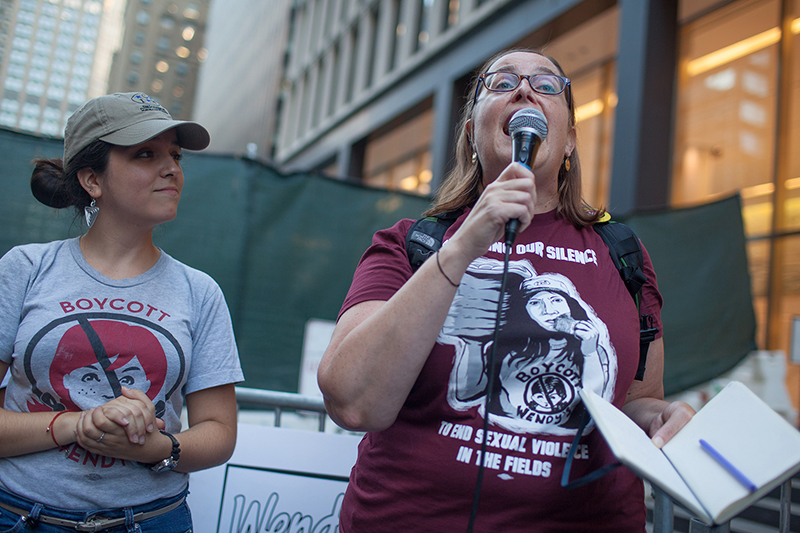
Wendy’s decision to pull purchases from the Mexican tomato industry came as the result of relentless pressure from consumers, farmworkers, celebrities, and the news media, and represented a meaningful step in the right direction. But the message of Thursday’s march could not have been more clear: We will not rest until Wendy’s joins the rest of the fast-food giants – McDonald’s, Burger King, Taco Bell, Subway, and Chipotle – in supporting the only proven solution to ending human rights abuse in U.S. agriculture, the Fair Food Program. Wendy’s newest excuses for its refusal to step up to real social responsibility – that greenhouses provide “inherently” better working conditions for farmworkers, and that widely discredited third-party auditors can be counted on to uncover and resolve any human rights abuses in the supply chain – have fallen flat with consumers, and grow weaker by the day.
And so, the marchers’ question remains: How much longer, Wendy’s?

